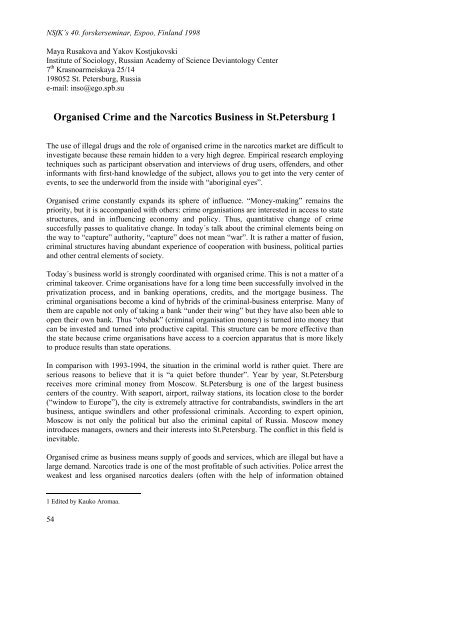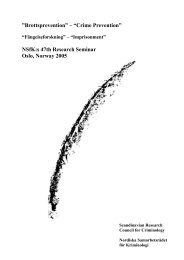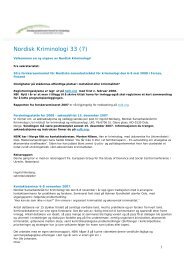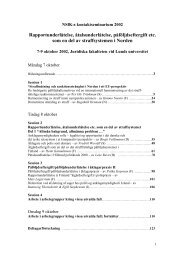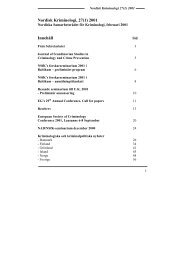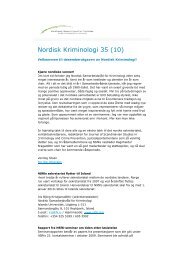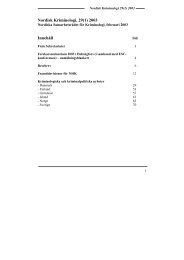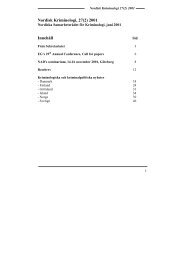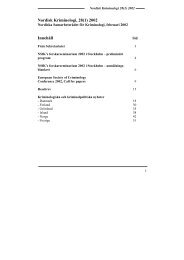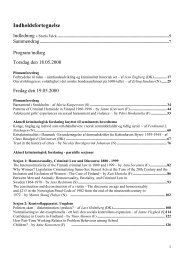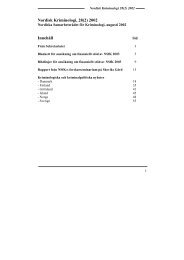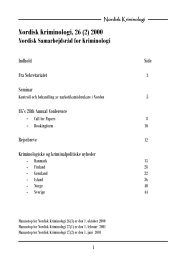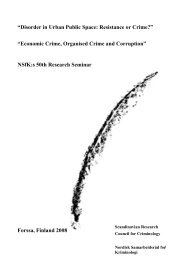Organised Crime & Crime Prevention - what works? - Scandinavian ...
Organised Crime & Crime Prevention - what works? - Scandinavian ...
Organised Crime & Crime Prevention - what works? - Scandinavian ...
You also want an ePaper? Increase the reach of your titles
YUMPU automatically turns print PDFs into web optimized ePapers that Google loves.
NSfK’s 40. forskerseminar, Espoo, Finland 1998<br />
Maya Rusakova and Yakov Kostjukovski<br />
Institute of Sociology, Russian Academy of Science Deviantology Center<br />
7 th Krasnoarmeiskaya 25/14<br />
198052 St. Petersburg, Russia<br />
e-mail: inso@ego.spb.su<br />
54<br />
<strong>Organised</strong> <strong>Crime</strong> and the Narcotics Business in St.Petersburg 1<br />
The use of illegal drugs and the role of organised crime in the narcotics market are difficult to<br />
investigate because these remain hidden to a very high degree. Empirical research employing<br />
techniques such as participant observation and interviews of drug users, offenders, and other<br />
informants with first-hand knowledge of the subject, allows you to get into the very center of<br />
events, to see the underworld from the inside with “aboriginal eyes”.<br />
<strong>Organised</strong> crime constantly expands its sphere of influence. “Money-making” remains the<br />
priority, but it is accompanied with others: crime organisations are interested in access to state<br />
structures, and in influencing economy and policy. Thus, quantitative change of crime<br />
succesfully passes to qualitative change. In today´s talk about the criminal elements being on<br />
the way to “capture” authority, “capture” does not mean “war”. It is rather a matter of fusion,<br />
criminal structures having abundant experience of cooperation with business, political parties<br />
and other central elements of society.<br />
Today´s business world is strongly coordinated with organised crime. This is not a matter of a<br />
criminal takeover. <strong>Crime</strong> organisations have for a long time been successfully involved in the<br />
privatization process, and in banking operations, credits, and the mortgage business. The<br />
criminal organisations become a kind of hybrids of the criminal-business enterprise. Many of<br />
them are capable not only of taking a bank “under their wing” but they have also been able to<br />
open their own bank. Thus “obshak” (criminal organisation money) is turned into money that<br />
can be invested and turned into productive capital. This structure can be more effective than<br />
the state because crime organisations have access to a coercion apparatus that is more likely<br />
to produce results than state operations.<br />
In comparison with 1993-1994, the situation in the criminal world is rather quiet. There are<br />
serious reasons to believe that it is “a quiet before thunder”. Year by year, St.Petersburg<br />
receives more criminal money from Moscow. St.Petersburg is one of the largest business<br />
centers of the country. With seaport, airport, railway stations, its location close to the border<br />
(“window to Europe”), the city is extremely attractive for contrabandists, swindlers in the art<br />
business, antique swindlers and other professional criminals. According to expert opinion,<br />
Moscow is not only the political but also the criminal capital of Russia. Moscow money<br />
introduces managers, owners and their interests into St.Petersburg. The conflict in this field is<br />
inevitable.<br />
<strong>Organised</strong> crime as business means supply of goods and services, which are illegal but have a<br />
large demand. Narcotics trade is one of the most profitable of such activities. Police arrest the<br />
weakest and less organised narcotics dealers (often with the help of information obtained<br />
1 Edited by Kauko Aromaa.


